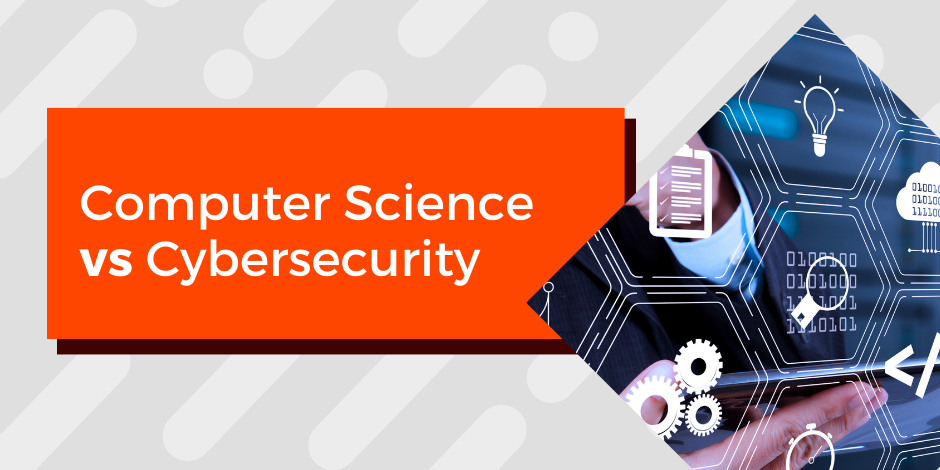Computer Science vs Cybersecurity: Exploring the Key Differences

Stay Informed With Our Weekly Newsletter
Receive crucial updates on the ever-evolving landscape of technology and innovation.
In the modern digital landscape, computer science and cybersecurity play vital roles in ensuring the integrity and security of our technology-driven society.
But what is the difference between computer science vs cybersecurity?
While computer science forms the foundation of all things digital, cybersecurity is the mantle of safeguarding our increasingly interconnected world.
Understanding the basics: What is computer science?

Computer science is an ever-expanding discipline that studies computers and computational systems.
Its roots can be traced back to the mid-20th century when the first computers were developed.
Over the years, computer science has evolved rapidly, keeping pace with technological advancements.
It focuses on the design, development, and analysis of algorithms and the theory of computation.
Computer science covers various topics, including programming languages, data structures, operating systems, computer networks, artificial intelligence, and more.
It explores how computers work fundamentally and seeks to develop innovative solutions to complex problems.
The origins and evolution of computer science
The field of computer science emerged as a distinct discipline in the 1950s.
It was influenced by various branches of mathematics and electrical engineering, particularly the work of pioneers like Alan Turing, John von Neumann, and Claude Shannon.
These early pioneers laid the groundwork for the development of computing machines and laid the foundation for the theoretical underpinnings of computer science.
Since its inception, computer science has witnessed rapid growth and diversification.
The advent of personal computers in the 1980s and the subsequent development of the internet in the 1990s further propelled the field forward, opening up new avenues for exploration and innovation.
Key concepts and principles in computer science
Computer science revolves around several key concepts and principles that form the backbone of the discipline.
These include computational thinking, abstraction, algorithms, data structures, and the theory of computation.
Computational thinking involves approaching problems from a computer’s perspective and using algorithms to solve them.
Abstraction allows computer scientists to focus on high-level concepts while hiding the underlying complexities.
Algorithms are a set of step-by-step instructions used to solve a specific problem, and data structures facilitate the organization and manipulation of data.
Meanwhile, the theory of computation delves into the limits and capabilities of computers.
Delving into cybersecurity: A closer look
Conversely, cybersecurity safeguards computer systems and networks from unauthorized access, misuse, and malicious attacks.
With the increase in cyber threats, cybersecurity has become indispensable in the digital age.
The rise of cybersecurity: A historical perspective
The need for cybersecurity became apparent as computers integrated into everyday life.
Cyber attacks, ranging from simple viruses to sophisticated hacking techniques, threatened digital information’s confidentiality, integrity, and availability.
Governments, businesses, and individuals sought to protect their data from cybercriminals.
As the frequency of cyber attacks grew, the field of cybersecurity emerged to counter these threats.
Cybersecurity experts developed strategies and techniques to detect, prevent, and mitigate cyber attacks, thereby ensuring the resilience of computer systems and networks.
Fundamental elements of cybersecurity
Cybersecurity encompasses various fundamental elements that contribute to the overall safety of computer systems and networks.
These elements include network, information, application, and operational security.
Network security involves securing the transmission and storage of data across computer networks.
Computer Science vs Cybersecurity: the intersection

While computer science and cybersecurity are distinct disciplines, they are profoundly interconnected and often rely on one another to achieve their goals.
Computer Science vs Cybersecurity: Shared principles and concepts
Computer science provides the theoretical foundations and practical tools for cybersecurity professionals to analyze and solve complex security problems.
Concepts such as algorithms, cryptography, and secure coding principles are essential components of cybersecurity.
Understanding the underlying principles of computer science enables cybersecurity experts to develop robust security solutions and stay ahead of evolving threats.
Similarly, cybersecurity challenges often drive advancements in computer science.
Computer Science vs Cybersecurity How Computer Science Supports Cybersecurity
Computer science plays a crucial role in supporting and enhancing cybersecurity practices.
Through its focus on algorithms, data structures, and programming languages, computer science equips cybersecurity professionals with the necessary tools to analyze and efficiently process vast amounts of data.
This ability is crucial in identifying potential threats, monitoring network activity, and responding to security incidents.
Additionally, computer science provides the theoretical foundations for cybersecurity research and developing new security algorithms and protocols.
Computer science vs cybersecurity: distinguishing the differences:
When comparing computer science vs cybersecurity, you’ll notice shared commonalities. They do differ, however, significantly in focus and career paths.
Computer science vs cybersecurity: differences in focus and approach
Computer science encompasses a broad range of topics and applications, emphasizing the theoretical and practical aspects of computing.
It covers software development, data analysis, artificial intelligence, and computer architecture.
The primary objective of computer science is to explore new computational innovations and improve the efficiency of existing systems.
Cybersecurity, on the other hand, narrows its focus to the protection of computer systems and networks from cyber threats.
The primary goal of cybersecurity is to identify and neutralize potential threats and ensure the integrity, confidentiality, and availability of digital assets.
Computer science vs cybersecurity: contrasting career paths
The diverse nature of computer science offers a wide range of career paths.
Computer science graduates can pursue careers in software development, data science, database administration, computer architecture, and more.
On the other hand, a career in cybersecurity typically involves roles such as network security analysts, cyber threat intelligence analysts, security consultants, or penetration testers.
Cybersecurity professionals work to identify vulnerabilities, assess risks, design secure architectures, and respond to security incidents.
Computer science vs cybersecurity: factors to consider

Choosing between computer science and cybersecurity requires careful consideration of various factors, such as personal interests, skills, and prospects.
Computer Science vs Cybersecurity: Assessing your interests and skills
Individuals passionate about problem-solving, logical thinking, and algorithmic design may find computer science appealing.
Computer science could be the right path if you enjoy exploring new technologies, building innovative solutions, and working with complex systems.
On the other hand, if you are fascinated by the mechanisms of cyber attacks, have a keen eye for detail, and possess a strong sense of ethics, a career in cybersecurity may be a better fit.
Cybersecurity professionals must stay up-to-date with the latest security threats and possess strong analytical and problem-solving skills.
If you’re interested in a career or upskilling in cybersecurity, consider the Institute of Data’s Cybersecurity program designed to prepare you to enter the industry in 3 to 6 months.
Computer science vs cybersecurity: career prospects
The increasing digitization of our world ensures a high demand for computer science professionals in various industries.
Rapid advancements like artificial intelligence and big data create new opportunities for computer scientists to innovate and shape the future.
Similarly, the escalating cyber threats and the growing reliance on digital systems guarantee a continuing demand for cybersecurity experts.
With the rise of sophisticated cyber attacks and the increasing value of digital assets, organizations recognize the need to invest in strong cybersecurity strategies and professionals.
Conclusion
Computer science vs cybersecurity: two distinct yet intertwining fields that play vital roles in the digital age.
While computer science focuses on theory and the practical aspects of computing, cybersecurity aims to protect systems and networks from cyber threats.
Understanding the differences between computer science vs cybersecurity by evaluating personal interests and skills can help individuals decide their future career paths in this ever-evolving technological landscape.
Are you interested in a career in cybersecurity?
The Institute of Data’s Cybersecurity program offers a practical, hands-on curriculum taught by industry-experienced professionals.
Ready to learn more about our programs? Contact one of our local teams for a free career consultation today.




